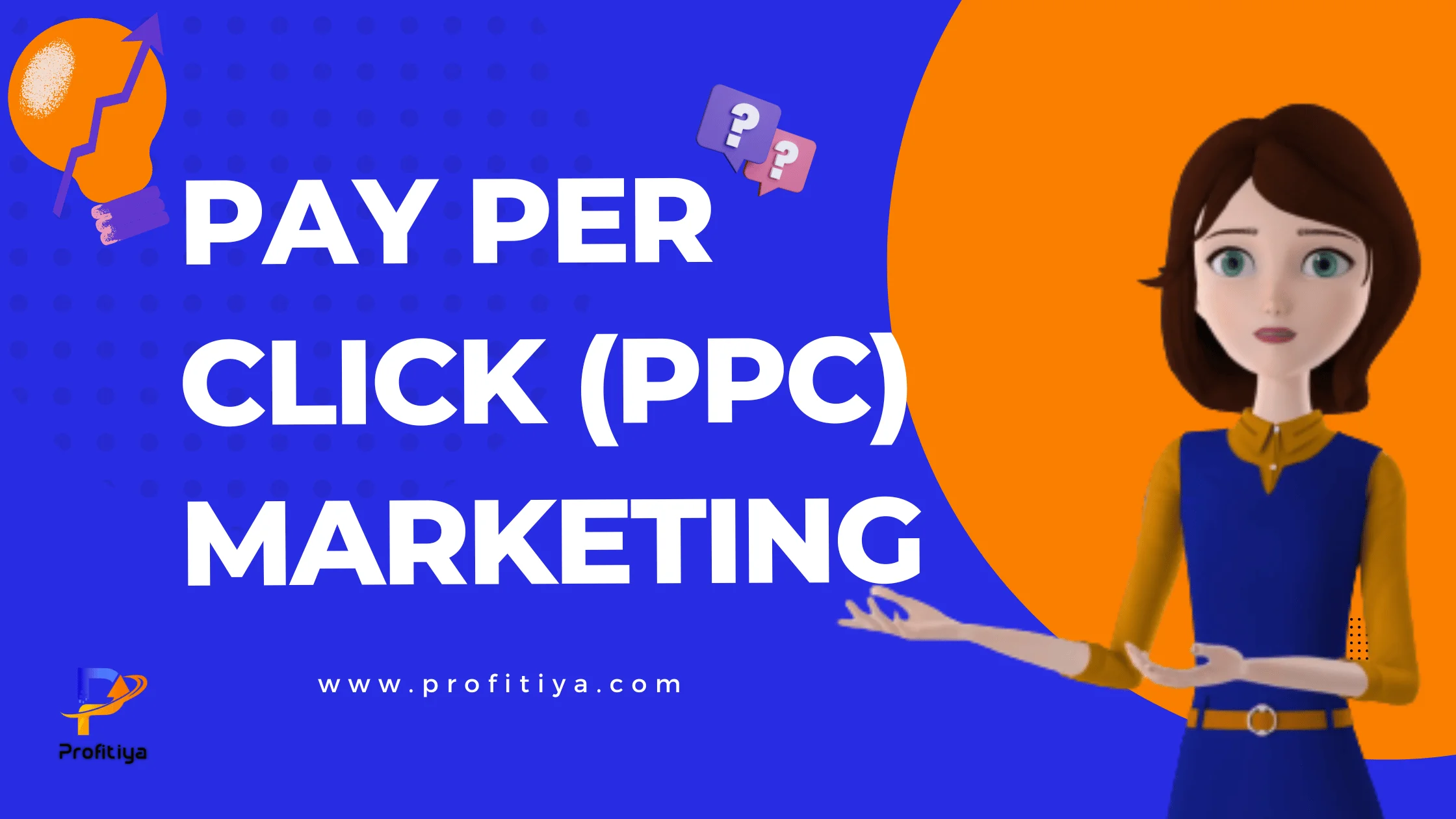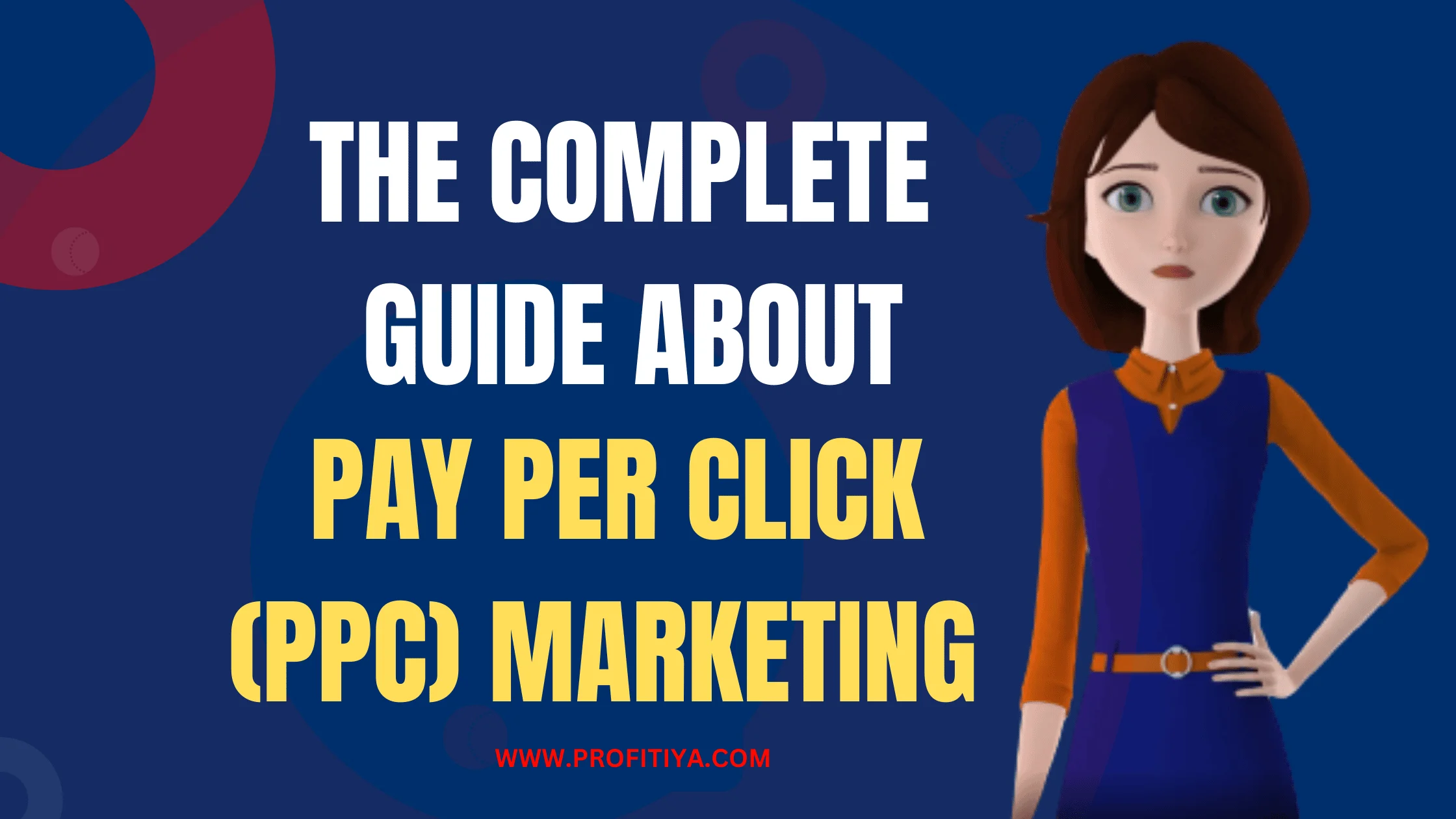As a small business, you know that online advertising can be a great way to reach new customers. But with so many options, it can be tough to know where to start. Pay per click marketing is a great option for businesses of all sizes. You can reach customers actively searching for your products or services by targeting your ads to specific keywords and phrases.
With PPC marketing, you only pay when someone clicks on your ad. That means you can control your advertising budget and get a good return on investment (ROI). This article will give you an overview of how PPC marketing works and how it can benefit your business. We’ll also update you with the latest trends and possible mistakes so that you can break your competition. So, let’s get started!

What Is Pay Per Click Marketing?
PPC advertising is a great way to get your business in front of potential customers. By bidding for ad placement in a search engine’s sponsored links, you can reach people who are already interested in what you have to offer. And since you only pay when someone clicks on your ad, it’s a cost-effective way to market your business.
There are a few different types of PPC, but one of the most popular is search engine advertising. In this type of PPC, you bid for ad placement in a search engine’s sponsored links when someone performs a search related to your business. It’s a great way to get your business in front of people who are already interested in what you have to offer.
Types Of Pay Per Click Marketing
PPC campaigns can drive traffic and sales to your website or online store. However, choosing the right type of campaign for your business goals is important. Some common types of PPC campaigns include the following.
Search Campaigns
These are the most common PPC campaigns, allowing you to show your ads to people searching for relevant keywords on Google or Bing.
Display Campaigns
These campaigns allow you to show your ads on websites and apps that are part of the Google Display Network.
Shopping Campaigns
These campaigns are specifically for eCommerce businesses, allowing you to showcase your products on Google shopping and other shopping websites.
Video Campaigns
These campaigns allow you to run ads on YouTube and other video platforms.
App Campaigns
These campaigns are designed to help you promote your mobile app on Google Play or the App Store.
What Is The Importance Of Pay Per Click Marketing Campaigns For Small Businesses?
As the world of online business becomes increasingly competitive, small businesses need to use every marketing tool at their disposal. Pay Per Click (PPC) marketing is one of the most effective strategies.
PPC marketing allows businesses to target highly specific audiences with laser precision. It means that businesses can make the most of their marketing budget by ensuring that their ads are seen by the people who are most likely to be interested in what they offer.
In addition, PPC marketing campaigns are customized to target specific demographics, interests, and locations. It makes it an incredibly powerful tool for small businesses that want to measure their marketing efforts as effectively as possible. If you are a small business owner working to take your online business to the next level, then investing in a PPC marketing campaign will give you a completely new level of visibility.
What Are The Benefits Of Pay Per Click Marketing?
Online business is booming, and PPC marketing is key to reaching potential customers. Here are some common benefits you can get from PPC advertising:
- PPC marketing allows businesses to target potential customers specifically
- PPC marketing is a great way to reach customers actively searching for products or services your business offers.
- PPC marketing is highly effective and efficient, making it a great option for small businesses with limited marketing budgets.
- PPC marketing is customized to fit your business goals and budget, making it a flexible marketing option.
- PPC marketing is measurable, so you can track your return on investment (ROI) and adjust your campaigns as needed.
What Are The Key Components Of A Pay Per Click Marketing Campaign?
To make the most of your PPC campaigns, there are a few key components that you should keep in mind:
1. keyword research
The first component of a successful PPC campaign is keyword research. Choose the right keywords for your campaigns. You need to understand what your target audience is searching for online. You can use keyword tools like Google AdWords, SEMrush, Aherfs,,, or Moz to help you find the right keywords.
2. Keyword Bidding
Once you have chosen the right keywords, the next step is to bid on those keywords. You can set your bid price for each keyword, but it’s essential to remember that the higher you bid, the more likely your ad is to be seen by potential customers.
3. Ad Copy
The third key component of a successful PPC campaign is effective ad copy. Your ad copy should be compelling and relevant to your target audience. It’s also important to include a call to action in your ad copy, such as “click here to learn more.”
4. Landing Page
An effective landing page is the fourth key component of a successful PPC campaign. Your landing page should be relevant to the keywords you are bidding on and the ad copy you are using. It should also include a strong call to action.
5. Website Analysis
After your PPC campaign has been running for a while, it’s important to analyze the results. You can use Google Analytics, or SEMrush to track your website traffic and conversion rates. It will help you determine whether or not your PPC campaign is successful and where you can make improvements.
By keeping these key components in mind, you can create a successful PPC marketing campaign for your small online business. Now let’s move on to the mistakes.
What Are Some Common Pay Per Click Marketing Mistakes?
Although PPC marketing is a great way to drive traffic to your online business, there are a few common mistakes that small businesses make that can end up costing them dearly. Here are four of the most common PPC marketing mistakes:
1. Not Doing Enough Keyword Research
One of the most important aspects of any PPC campaign is keyword research. You need to ensure that you are targeting the right keywords to attract the right kind of traffic. If you don’t do enough keyword research, you could waste a lot of money on keywords that no one is searching for.
2. Bidding Too High On Keywords
Another common mistake is bidding too high on keywords. You want to ensure that you are bidding on keywords relevant to your business, but you don’t want to bid so high that you are wasting money. There is a fine line between the two, and it’s important to find the right balance.
3. Not Using Negative Keywords
Another common mistake is not using negative keywords. Negative keywords are key phrases that you don’t want your ad to show up for. For example, if you sell women’s clothing, you might want to add “men” as a negative keyword so that your ad doesn’t appear when someone searches for “men’s clothing.”
4. Not Tracking Your Results
One of the most common PPC marketing mistakes is not tracking your results. It’s important to track your click-through rate (CTR), conversion rate, and cost per conversion to see how well your campaign performs. If you’re not tracking your results, you won’t be able to improve your campaign over time.
5. Not Using The Right Tools
There are a lot of different PPC marketing tools out there, and it’s important to use the right ones for your business. If you’re not using the right tools, you could miss out on features that could help you save money or improve your results. We use SEMrush and we strongly believe that it’s all one marketing tool and can help you to win the game.
6. Not Managing (Optimizing) The Campaign
A common mistake is to set up a PPC campaign and then let it run on autopilot. However, it’s essential to regularly check in on your campaign and ensure it is still performing well. If you don’t optimize your campaign regularly, you could be wasting money on keywords that are no longer relevant or losing money.
7. Having A Bad Website
Your PPC campaign can only be as successful as your website. If you have a bad website, potential customers will likely leave as soon as they arrive. Make sure your website is well-designed, user-friendly, and informative if you want to convert PPC clicks into customers.
8. Making Technical Mistakes
There are a lot of technical aspects to PPC marketing, and it’s easy to make mistakes if you’re not familiar with the system. You could waste a lot of money if you make technical mistakes, such as using the wrong keyword match type or not setting up conversion tracking.
How Can You Avoid Making Pay Per Click Marketing Mistakes?
There are a few key things you can do to avoid making PPC marketing mistakes:
1. Do Your Research
Before you start any PPC campaign, it’s important to do your research. It includes keyword research, competitor research, and understanding the different types of PPC campaigns. By taking the time to do your research, you can avoid making common mistakes that could cost you money.
2. Test Your Campaigns
Once you’ve launched your PPC campaign, it’s important to test it to see how it’s performing. It includes tracking your-through rate, conversion rate, and cost per conversion. You can identify any problems by testing your campaign and making necessary changes to improve your results.
3. Stay Up To Date With Latest Algorithm
The world of SEO and PPC is constantly changing, and it’s important to stay updated with the latest changes. It includes new features, updates to the algorithm, and changes in threads displayed. By doing so, you can ensure that your campaigns are always running smoothly.
4. Hire An Expert
If you’re not confident in your ability to run a successful PPC campaign, you may want to consider hiring an expert. A PPC specialist can help you create and manage a successful campaign. While this may cost you more upfront, it could save you money in the long run. By following the tips above, you can ensure that your PPC campaigns are successful.
What Are Some Pay Per Click Marketing Trends For The Future?
Pay-per-click (PPC) marketing is one area that is constantly evolving. What worked last year may not be effective this year, so staying up-to-date on the latest trends is important. So, what can you expect in the world of PPC marketing in the coming year? Let’s discuss:
1. Increased Use Of Automation
Automation is nothing new in marketing, but it’s become increasingly important in PPC. With the right tools, you can automate tedious tasks like keyword research and ad creation, freeing up your time to focus on more strategic tasks.
2. More Personalized Ads
As consumers become savvier, they’re also becoming more discerning. They’re tired of being bombarded with generic ads that have nothing to do with their interests. You’ll need to create more personalized ads relevant to your target audience to stand out. It could involve using data from your website or CRM to create custom audiences and deliver targeted messages.
3. Focus On Mobile Devices
More people are using mobile devices to search for products and services, and Google also prefers mobile-friendly ads. To stay ahead of the curve, you’ll need to ensure your website and ads are optimized for mobile devices. It means having a responsive design, fast loading times, and clear call-to-actions.
4. A Shift To Visual Content
Visual content is more engaging than text, and it’s easier to consume on a small screen. For these reasons, we expect to shift towards more visual content in PPC ads in the coming year. It could involve using more images and videos in your ads or even incorporating augmented reality (AR) and virtual reality (VR) into your campaigns.
5. Diversification
Diversification is key in any business, including diversifying marketing channels. As PPC becomes more competitive, it’s important to consider other marketing channels to complement your campaigns. Content marketing, email marketing, and social media marketing can all be effective ways to reach your target audience. By diversifying your efforts, you’ll be able to reach more people and achieve better results.
5. Testing, Testing, Testing
The only way to know what works best for your business is to test different approaches. Try out new ad formats, experiment with different targeting options, and constantly test and measure your results. Only by testing will you find the right mix of strategies that work for your business. So don’t be afraid to experiment in the coming year!
6. First-Party Data
First-party data is data that you collect yourself, such as through website visitors, newsletter subscribers, and social media followers. This data is incredibly valuable because it’s specific to your business and audience.
In the past, businesses have relied heavily on third-party data, such as demographic databases. However, this data is becoming increasingly inaccurate and is often overused.
First-party data, on the other hand, is more accurate and can be used to create highly targeted campaigns. If you’re not already using first-party data, now is the time to start collecting it.
How Can You Measure The Success Of Your Pay Per Click Marketing Campaign?
As a small business owner, you may be looking for ways to measure the success of your PPC marketing campaign. After all, you want to ensure that your investment is paying off and that you are getting a return on your investment. Here are some key metrics that you can use to measure the success of your PPC marketing campaign.
1. Online Sales
One of the most important metrics to track is online sales. This is one of the main goals of your PPC marketing campaign – to drive sales and generate revenue. You can track online sales by looking at your website’s analytics to see how many sales were generated from PPC traffic.
2. Lead Generation
Another important metric to track is lead generation. If your PPC campaign drives customers, it is considered a success. You can track lead generation by looking at the number of new leads generated from PPC traffic.
3. Click-Through Rate (CTR)
The click-through rate (CTR) is a metric that measures how often people who see your ad click on it. A high CTR means that your ad is relevant, engaging, and more likely to result in a sale or lead. You can track your CTR by looking at your website’s analytics to see how many people clicked on your ad.
4. Conversion Rate
The conversion rate is the percentage of people who take the desired action, such as making a purchase or signing up for a newsletter, after clicking on your ad. A high conversion rate means that your ad is effective and that people are taking the desired action. You can track your conversion rate by looking at your website’s analytics to see how many people took the desired action after clicking on your ad.
5. Cost Per Acquisition (CPA)
The cost per acquisition is the amount of money you spend on your PPC campaign divided by the number of sales or leads you generate. A low CPA means that your PPC campaign is effective and that you are generating a return on your investment. You can track your CPA by looking at your website’s analytics to see how much money you spent on your PPC campaign and how many sales or leads you generated from it. By tracking these key metrics, you will be able to measure the success of your PPC marketing campaign and ensure that it is effective.
What To Do If I Don’t Have Time?
Managing a successful PPC campaign can be a time-consuming and complex task. That’s where a PPC marketing expert can come in handy. A good PPC expert will have extensive experience and knowledge in all aspects of PPC, from keyword research to bid management to ad copywriting. They can also provide valuable insights into how your PPC campaign is performing and make recommendations for improvements.
If you’re looking to take your online business to the next level, hiring a PPC marketing expert from the team of Profitiya is a great way to get started.
Profitiya is a full-service digital marketing agency that helps small businesses achieve their online marketing goals. We offer various services, including website design, search engine optimization, social media marketing, and more. We have over 6 years of experience in the digital marketing industry, and we’re dedicated to helping our clients succeed online.
You can learn more about us or book a free consultation to talk to us about your business challenges.
About The Author
With a deep understanding of SEO and a commitment to transparent communication, we guide you through the ever-changing digital landscape by ensuring your brand gets the attention it deserves. We believe in the power of helpful content and staying up-to-date with the latest industry trends to provide timely updates for your website. Trust Profitiya’s team to be your partner in achieving online success!

